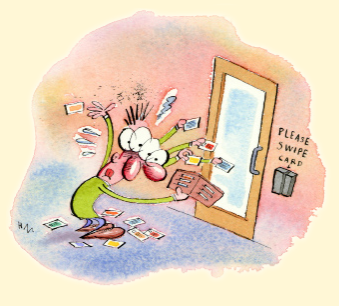Swipe Cards
 Lock the dorms and destroy kenyon's atmosphere of openness and trust? When the proposal went public in October 2007, e-mails lit up the campus network, most of them enraged.
Lock the dorms and destroy kenyon's atmosphere of openness and trust? When the proposal went public in October 2007, e-mails lit up the campus network, most of them enraged.
"Kenyon is ... a different kind of college, one without a pathetic reliance on little rectangles of plastic. Let's keep it that way."
"Any person who proposes this does not have a true love of this campus and does not understand its unique beauty."
"... this is not an effort toward our safety. This is a means of artificial reassurance, meant to placate rather than protect."
"... we are not like other colleges ... and we should protect the little details and quirks that define us and set us apart."
"This is the single most un-Kenyon proposition I've seen in my four years at Kenyon."
As the trustees gathered on campus for their fall meeting, students set up a fake "swipe station" at the College gates, with a big poster warning "Have your ID card ready." Covering the central post was a sign bearing the Kenyon shield and the instructions, "Form two lines; swipe your card and keep moving."
Petitions circulated. Students protested outside the Eaton Center, where the trustees were meeting. And the uprising succeeded. Given the vehemence of student opposition, and their contention that the administration was trying to rush through a decision without adequate discussion, the Board of Trustees decided to hold off.
Before finishing the story, we should point out that the swipe-card brouhaha bore many of the hallmarks of other classic Kenyon controversies. A central argument involved Kenyon's "difference"—change would undermine the College's unique character. A seemingly small matter assumed the proportions of ruination. Trust, communication, and respect for student views were background issues, feeding general discontent. The ultimate threat arose: as alumni, we won't give money. Long, reasoned argumentation figured in the debate. So did whining, ranting, and profanity. And, along with all the Sturm und Drang, there was some very clever humor.
In the end, the card-key system came to pass, after further discussion and more student input. Starting last fall, most of the dorms were locked, but only at night. Students who forget their ID cards—and, for the record, they're called "proxy cards" (for the "proximity chips" they hold)—can bang on a window and hope a friend will let them in. Or they can call campus safety (and pay a fine).
There are reports that credit cards can demagnetize the proxy card. But it's hard to imagine Kenyon students carrying credit cards, isn't it? After all, nobody needed plastic in Eden.

 Delicious
Delicious Facebook
Facebook StumbleUpon
StumbleUpon Digg
Digg reddit
reddit